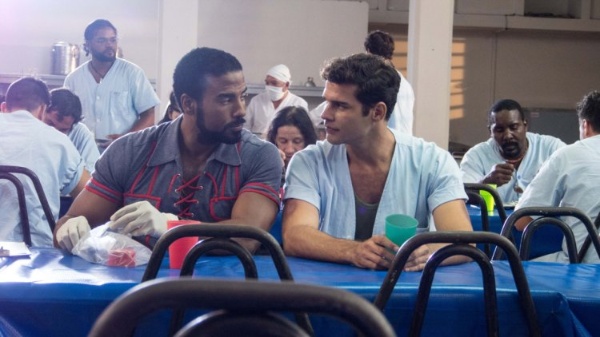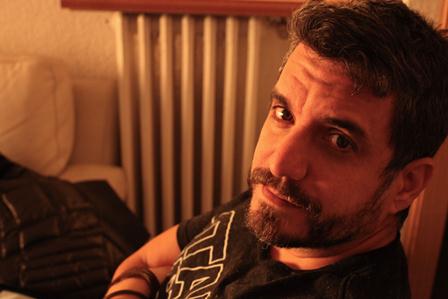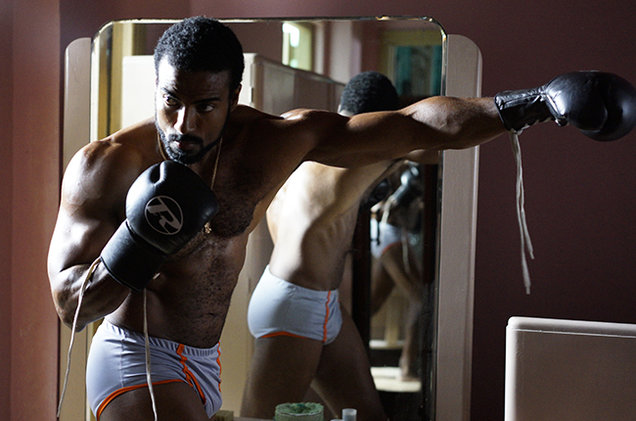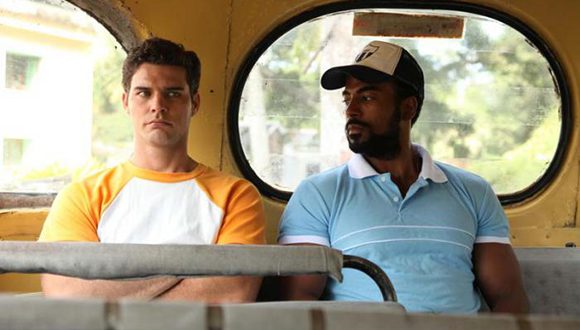Interview: Pavel Giroud on Cuban Oscar Submission 'The Companion'
 Saturday, December 3, 2016 at 6:00PM
Saturday, December 3, 2016 at 6:00PM
By Jose Solis.

Cuba’s Oscar entry The Companion, will surely be seen with new eyes with the recent death of Fidel Castro, as more stories about his decades long regime will come to the surface. Directed by Pavel Giroud, the film is set in a sanatorium in the outskirts of Havana, where HIV positive people were sent to live in the 1980s in an effort of the government to try and contain the epidemic. Each of the patients was assigned a companion, who would report on their behaviors and habits (no smoking or drinking allowed!), one of them is former boxer Horacio (Latin Grammy winner Yotuel Romero) who seeks another chance at glory, while he has to look after the rebellious Daniel (Armando Miguel). The two men develop an unlikely friendship which helps as the channel through which we see other subplots unfold, all of which contribute to helping audiences come up with a more complete portrait of what it was like to live in Cuba. Without resorting to sensationalization, the film both celebrates the country and criticizes the regime in which health came at the price of liberty. I spoke to director Giroud about cult Cuban musicals, his research for the film, and what it’s like to be the first Oscar submission after Cuba and the US have normalized diplomatic relations.
Read the interview after the jump.
JOSE: Why did you want to write and direct this film?
PAVEL GIROUD: I was reading a Cuban newspaper which said our country had one of the best indexes when it came to controlling the spread of HIV infections. I wondered how could a country like Cuba in which sex is seen with so little judgment, during an era in which we didn’t know much about safe sex, had been able to achieve this. I began doing my research and found out the Cuban government had used the sanatoriums, I was fascinated by this especially when I found out about the companions, so I knew I needed to tell this story.
JOSE: This means you might have known companions without knowing they were companions. Did they have to lead double lives and keep this a secret?
PAVEL GIROUD: No, we knew about the sanatoriums, we just didn’t want to talk about it. People were relieved they didn’t have to share their space with HIV positive people, it wasn’t a state secret, we knew about it, but didn’t know how it worked. I can imagine companions avoided talking about it because people thought you could become infected just by touching others, so even people who worked there avoided talking about it.
 Director Pavel Giroud
Director Pavel Giroud
JOSE: I thought it was so interesting when they mention “the rainbow” in the film - which is the wing where they kept gay HIV positive people - was it easy for you to focus on the companion when there must’ve been dozens of stories you could tell?
PAVEL GIROUD: I love this question because I always end up talking about this, even when no one asks me about it. The hardest thing in this film was figuring out what to leave out. I found so many stories that outdid one another in terms of dramatic potential, so I would like to make a TV series at some point. My film is about two men, and all the other stories I found helped me create the context but didn’t help the focus of the plot. I used to say this film got fat very easily, but grew with difficulty, we had so much information to work with, that it made it very hard for me to move forward with the story.
Can you talk about the gender and sex dynamics in the film? The person who runs the sanatorium is a woman for example, and it’s so rare to see female characters who run things and tell men what to do. Also the story is about two men, neither of whom are gay, usually movies about HIV and men, are always about gay men.
Yes, even sometimes people see the poster with the men and read HIV, they assume it’s a gay film. I wasn’t trying to make something new per se, but it was the fact that this was so different that made me want to tell the story. While all over the world HIV was called “the gay cancer”, HIV didn’t come to Cuba from gay men in San Francisco, but from heterosexual Cuban soldiers who had been stationed in Africa, fighting apartheid in South Africa, or places like Namibia and Angola where they spreading socialism. While all over the world gay men were the face of AIDS, in Cuba it was the heroes of the revolution. Can you imagine this? In a country where machismo is as prevalent as in Cuba, the fact that soldiers were infecting people felt like a curse. This was never talked about though, I think it was one of the reasons why the government chose to have HIV positive people live away from everyone else. Their problem came when civilians became infected as well and had to move to the sanatorium and live under military rules. I truly wanted to share this with the world.

I really liked the scene where the characters go out for the first time and go to the movies where they watch a Cuban boxing drama, what film was that?
There’s a story behind this, in my screenplay they went to see Rocky II, where the trainer tells Rocky to use his left hand instead of the right. The problem was that due to the embargo between the US and Cuba I wasn’t allowed to use clips from a Hollywood film, so I did research about Cuban films from this era I could use. I found a cult film called Patakín which was a musical that’s little known outside the country, but was made by one of our great filmmakers Manuel Octavio Gómez. I had watched the film as a child, and remembered there was a boxing scene.
That sounds amazing! A musical with boxing! (You can watch some clips here)
Yes, the plot is completely insane. They use Afro-Cuban saints and legends as an excuse to set up a boxing match between the saints Chango and Ogún, who in the legends fight with swords, but in the film they wanted to use boxing since it’s one of the most popular sports in Cuba. It’s as if it was custom made for my film.
Recently I was doing research about Hispanic musicals and couldn’t find that many.
You need to watch this one, it’s said to be the only musical ever made with socialist realism codes.
That scene is also great because Horacio sees himself reflected in the boxer onscreen. Have you had moments watching films where you suddenly realize things about yourself as well?
I think that’s happened to all of us. What’s happened to me most often though is that making my films I’ve discovered myself in my characters. I think half of me is in Horacio and half of me is in Daniel, I saw myself in both of them and only realized it when I watched the completed film. I even see negative things about the characters that are in me. I think we all go to the movies to see ourselves.

This is the first film Cuba has submitted to the Oscars after re-establishing diplomatic relations with the US. Do you think this puts any added pressure on your film?
I wasn’t expecting the country would select my film for starters. But not only is this the first year with diplomatic relations between both countries, it was also the year with the most Cuban films in competition, there were about eight, so I wasn’t expecting my film to be chosen. I know the government doesn’t like my film, I was surprised they even showed it in theaters, not to mention having them select it for the Oscars. I feel like that college kid who was asked to join the USA basketball dream team in 1992 and got to play with Michael Jordan. I think people in Cuba want something good to happen to them, I get such beautiful messages in social networks. It’s also a great encouragement for independent cinema, my film was made outside the National Film Institute’s parameters, so independent filmmakers are also excited about it. This is a blessing.
I hope we might get to see more Cuban films in America and that distribution becomes more open. What are you the most excited about to share about Cuban cinema with audiences in America specifically?
For over twenty years our films haven’t been shown much outside of Cuba. I love my country, not only its films, I’m so happy we’re no longer isolated from the world. It’s about time all of our potential is shared with the world, we’ve had more success in this with culture, but also have made great contributions to science and the economy. I don’t want Cuba to be the odd man out anymore. I’m also excited we can share some of this oddness with the world, a movie like The Companion could only come out of Cuba!


Other Foreign Film Oscar Interviews
Singapore - Boo Junfeng on the prison drama The Apprentice
South Korea - Kim Jee-woon on The Age of Shadows
Finland on the boxing drama The Happiest Day in the Life of Olli Mäki
Austria - Maria Schrader on Stefan Zweig: Farewell to Europe
Italy - Gianfranco Rosi on the prize-winning Fire at Sea
Colombia - Jose Luis Rugules on Alias Maria
Israel - Elite Zexer on Sandstorm
Foreign Film Contender Reviews
Death in Sarajevo - Bosnia & Herzegovina | Neruda - Chile | Mother - Estonia | Elle - France | Toni Erdmann - Germany | The Salesman - Iran | Chevalier - Greece | Sand Storm - Israel | Fire at Sea - Italy | Desierto - Mexico | A Flickering Truth - New Zealand | Apprentice - Singapore | Age of Shadows- South Korea | Julieta - Spain | My Life as a Courgette - Switzerland | Under the Shadow - UK | From Afar - Venezuela
 Cuba,
Cuba,  Oscars (16),
Oscars (16),  Pavel Giroud,
Pavel Giroud,  foreign films,
foreign films,  sports
sports 


Reader Comments (8)
There are many classic Cuban films
I am really looking forward to see this movie.
Daisy Granados, Mirta Ibarra, Yailene Sierra, Yordanka Ariosa... Cuban actresses are fierce! Hopefully now we'll get more releases.
I saw that movie in Chicago last year and I had the premonition that it would reach the Oscars
@Mark --
I missed The Companion at CIFF, but after reading this post, I'm hoping that it will be released again here in the States, especially with the thaw in the Cuban-American relations. Or at least become available on a streaming platform.
two sizzlin' hot actors and they're playing straight? what a cocktease
I agree with Par- the images have a very homoerotic tension
@Par and Jaragon If you think the images are titillating, just wait until you see the film! Those two actors are SEXY!!
This film is great, awesome. The history, the actors, and a very strong and sad at the same time case scenario.
Pavel Giroud is maybe the best, and most international cuban director.
I'm pretty sure that Cuba is a very difficult panorama to make this kind of movies, so, he have all my support.
HOPE HE GOES FOR THE OSCAR!